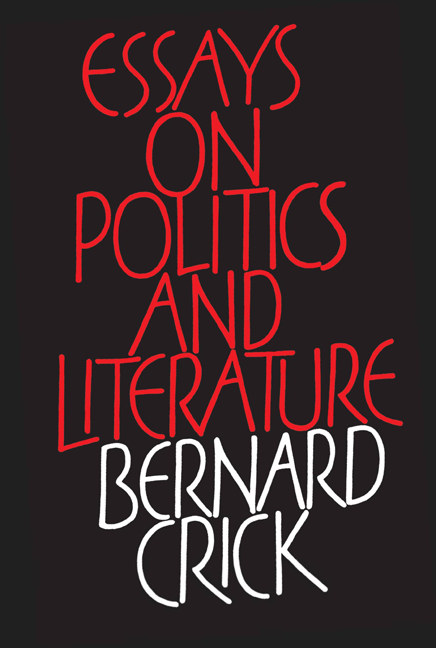Book contents
- Frontmatter
- Contents
- Preface
- Acknowledgements
- Foreword by David Daiches
- One Literature and Politics
- Two The Political in Britain’s Two National Theatres
- Three Young Writers of the Thirties
- Four Koestler’s Koestler
- Five Hannah Arendt: Hedgehog or Fox?
- Six Beatrice Webb as English Diarist
- Seven Words
- Eight My Lse
- Nine Reading The Observer as a Complex Text
- Ten On the Difficulties of Writing Biography and of Orwell’s in Particular
- Eleven Reading Nineteen Eighty-Four As Satire
- Twelve Animal Farm For Schools
- Thirteen Orwell and English Socialism
- Fourteen On the Orwell Trail
- Fifteen Wedekind’s Spring Awakening
- Sixteen Horvath’s Tales From the Vienna Woods
- Seventeen Pinter’s No Man's Land
- Eighteen Polly By Gaslight
- Nineteen Edgar Catches Jenkins’ Ear at the Barbican
- Twenty Barrault at the Barbican
- Index
Twenty - Barrault at the Barbican
Published online by Cambridge University Press: 24 September 2020
- Frontmatter
- Contents
- Preface
- Acknowledgements
- Foreword by David Daiches
- One Literature and Politics
- Two The Political in Britain’s Two National Theatres
- Three Young Writers of the Thirties
- Four Koestler’s Koestler
- Five Hannah Arendt: Hedgehog or Fox?
- Six Beatrice Webb as English Diarist
- Seven Words
- Eight My Lse
- Nine Reading The Observer as a Complex Text
- Ten On the Difficulties of Writing Biography and of Orwell’s in Particular
- Eleven Reading Nineteen Eighty-Four As Satire
- Twelve Animal Farm For Schools
- Thirteen Orwell and English Socialism
- Fourteen On the Orwell Trail
- Fifteen Wedekind’s Spring Awakening
- Sixteen Horvath’s Tales From the Vienna Woods
- Seventeen Pinter’s No Man's Land
- Eighteen Polly By Gaslight
- Nineteen Edgar Catches Jenkins’ Ear at the Barbican
- Twenty Barrault at the Barbican
- Index
Summary
The lights dimmed into total darkness. Then a spot illuminated the great actor, black shirt and black trousers, miming walking up stairs, a routine mime-exercise done with mastery. There was huge applause for the 73-year-old cult hero both of the theatrical profession and all lovers of theatre. Then he began to speak, in French. The surprise should not have been too great, but as he went on and on, rustle and whispers spread as many waited for the performance to begin. But this was it. Now like most of the audience, I suspect, I certainly ‘have to concentrate’ and ‘don't quite get every word’, but he was going on and on, with beautiful gestures, eloquent face and hands part of the language, truly looking 20 years younger than we knew he was, so a good advertisement for part of what he was saying: ‘By now I think I have contracted a religious fervour toward the human body. I don't mean the body limited to the skin and five senses but, let us call it, the integral, the magnetic, perhaps mystical body.’
I take this from a translated extract of a mere 150 words that appeared on a little leaflet on our seats, which was simply the first two minutes of a long lecture: ‘And so I have wanted to compose a show that celebrates the language of the body by running in bird's eye view over the history of mime, of pantomime, both of breathed language and, more generally, of the “magnetic body”.’
He used these exact words from the little leaflet. I make this point partly to convey something of the flavour but also, in view of what subsequently occurred, to make the point that there was a full script. Someone could have provided full programme notes as at a concert. Anyway, after about forty minutes of going on in a French philosophical way about mime being universal language of communication, punctuated or illustrated by two very brief mimes (that of the birds flying and of the man undressing on a stony beach and swimming) just as the paradox of talking about mime so fluently began to dawn on us and just as I was beginning to tire a little—to be honest—at the effort of following a highly abstract discourse in a foreign language, though the sheer delight of watching him and of sharing in this great occasion left me very pleased and quite content, a voice cried out from the gods: ‘ I am veiy angry.
- Type
- Chapter
- Information
- Essays on Politics and Literature , pp. 254 - 256Publisher: Edinburgh University PressPrint publication year: 2020

